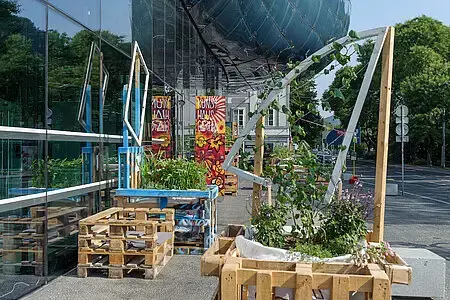Kunsthausgarten

- The Kunsthausgarten in Graz is a contemporary urban garden that complements the iconic Kunsthaus Graz, also known as the "Friendly Alien." This green space serves as a fusion of art, nature, and modern design, offering visitors a refreshing contrast to the avant-garde architecture of the museum. Located along the banks of the Mur River, the garden provides a tranquil retreat where visitors can relax amidst carefully curated landscapes, sculptures, and art installations. It extends the creative spirit of the Kunsthaus into an open-air setting, making it a dynamic cultural hub for both locals and tourists.
- Designed with sustainability in mind, the Kunsthausgarten features a variety of indigenous plants, decorative flower beds, and green spaces that blend harmoniously with the surrounding urban environment. The layout encourages exploration, with winding pathways leading to hidden seating areas and artistic displays. Seasonal plantings ensure that the garden remains vibrant throughout the year, offering ever-changing visual delights that reflect the natural cycle of growth and transformation. The integration of green spaces within the bustling cityscape enhances the aesthetic appeal of the area while promoting biodiversity.
- More than just a garden, Kunsthausgarten is a venue for cultural activities, outdoor exhibitions, and community gatherings. It frequently hosts art performances, live music events, and interactive workshops that bring together creative minds from different disciplines. The synergy between the natural and artistic elements makes it a favorite spot for photographers, artists, and anyone looking for inspiration. The presence of sculptures and temporary art installations further enriches the experience, blurring the lines between gallery space and nature.
- Whether you're visiting the Kunsthaus itself or simply looking for a peaceful outdoor space to unwind, the Kunsthausgarten offers a unique atmosphere where art and nature coexist. It is a place for contemplation, creativity, and cultural engagement, inviting visitors to see the relationship between the built environment and the organic world in a new and thought-provoking way.
